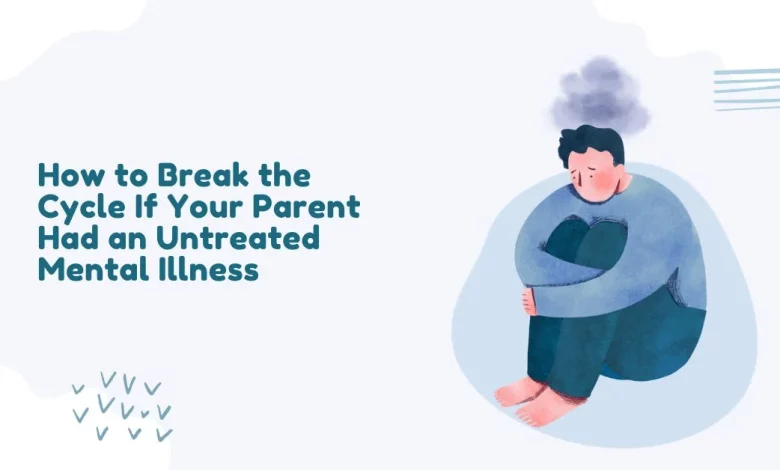How to Break the Cycle If Your Parent Had an Untreated Mental Illness

Mental health has bubbled up as one of the hottest topics of recent years. The conversation has percolated through both social and professional platforms as the pandemic has shifted how we live and work. This increased chatter has many people considering, often for the first time, whether their feelings are related to mental illness.
In many communities and families, mental health is buried under the business of life. Sometimes, it’s whispered that a family member’s behavior may be the result of an undiagnosed mental illness. These untreated and unaddressed mental health concerns can make for a tense family dynamic, especially if attempts to discuss them fall flat.
Mental illness often runs in families, thanks to the genetic traits passed on. This makes it essential to acknowledge and address mental health issues. While you can’t medicate away mental illness, you can manage and treat it as you pursue the best of life.
1. Get an Assessment of Your Mental Health
All of the online quizzes in the world aren’t an adequate replacement for a professional assessment. Seek out a diagnosis from a trusted professional to determine what you’re dealing with.
Most professionals use a standardized questionnaire to assess the frequency and severity of your feelings. The numerical score helps drive the suggested diagnosis, but their professional insight and your conversations help them fine-tune their findings. Take your assessment in stride, understanding that your situation is unique and deserving of customized treatment.
Once you’re confident of your diagnosis, consider your options. Many times, a multidisciplinary approach involving both therapy and medication can lead to the best outcomes. Mental health treatment can even be found online, making access easier than ever. As you pursue treatment, research the options available to you that also fit your lifestyle and schedule. Keep an open mind regarding recommended medications, dosages, and lifestyle changes as you and a professional design a plan that works for you.
2. Share Your Journey With Your Family
Your diagnosis can come as a shock, or it may be one that you’ve suspected for some time. Often receiving a diagnosis can feel like a relief, especially when it helps explain what you’ve been experiencing. You may also realize that others in your family share similar traits and behaviors.
While it may be tempting to diagnose family members with your same mental illness, focus on sharing your story instead. As you discuss your journey, concentrate on your experience without applying attribution to others, even if it’s warranted.
At the outset, others may feel attacked if your diagnosis is applied to them, especially if it carries a stigma. Aim to share your experience as transparently as you feel you’re able. Experiencing your journey in real time can open up much-needed conversations that have been festering for years.
Assess your appetite for raw, real, and sometimes upsetting conversations, protecting your mental health first. If others are dealing with undiagnosed mental illness, these discussions can be tough, so be deliberate in your efforts.
3. Aim to Normalize Conversations About Mental Health
Your mental health journey isn’t the only thing to discuss with friends and family, but pursuing help and support is part of your life. After the initial disclosure of your diagnosis and engagement with care and medication, feel confident discussing your experiences.
If your new medication is working well and you’re excited about it, share that with your friends and family. When your therapist provided great insight, and you applied it in a situation and it worked, celebrate that with others. In doing so, you’ll take strides toward normalizing mental health conversations in your daily life.
Mental illness, treatment, and therapy are often seen as taboo, making for a challenging climate around the topic. Generational differences, cultural norms, and societal expectations often put the onus on the individual to suppress their feelings. This behavior isn’t healthy even for the average person, much less those with mental illnesses.
Because of the stigma surrounding mental illness, it’s easy to see why unmanaged mental health can be damaging to individuals and families. Being open about your experiences can encourage others to feel confident asking for help, which can improve communities over time.
Creating a New Family Dynamic
Acknowledging mental illness takes bravery, and your pursuit of treatment is admirable. Knowing that others in your family may be suffering without a diagnosis and treatment can be heartbreaking and frustrating. While you’re working to improve your daily life, your family’s unmanaged mental health can be draining.
Focus on staying the course while offering a listening ear and empathetic heart to their unique journeys. Even if your encouragement doesn’t result in them seeking treatment, they can be more aware of your situation and needs. Aim to pursue your treatment to the fullest extent you’re able, even if others reject similar help. As your outcomes improve, they may be inspiring to others, potentially convincing them to seek help.
If their resistance persists, acknowledge how challenging it can be to admit a mental illness is possible. Empathize with your family members and provide support if and when they pursue treatment in their own time. Remember that each of you is on your own journey. They may or may not follow your lead, so keep your focus on reaching your own happier shore.





